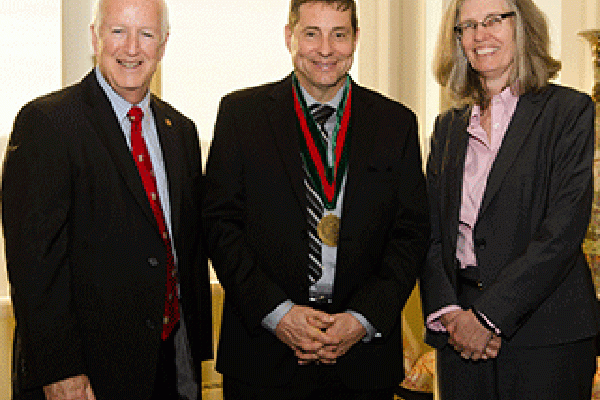Washington People: Mark Thoelke
Mark Thoelke’s work ethic has contributed to his success in starting and leading the hospitalist division at Washington University School of Medicine. He has been called “the doctor’s doctor,” a term that refers to a physician whom another physician would recommend to family and friends.
Wong named Green Professor of Pediatric Neurology
Michael Wong, MD, PhD, has been named the Allen P. and Josephine B. Green Professor of Pediatric Neurology at the School of Medicine. Wong sees patients with pediatric epilepsy at St. Louis Children’s Hospital and specializes in basic research into the origins of the illness.
Toward a theory of child well-being
Can a comprehensive picture of child well-being be established? And how can a deeper understanding of the nature of well-being help further its measurement? A new paper, co-authored by Ramesh Raghavan, MD, PhD, associate professor at the Brown School at Washington University in St. Louis, attempts to tackle those questions.
Carr becomes first Wolff professor of geriatric medicine
David B. Carr, MD, has been named the inaugural Alan A. and Edith L. Wolff Professor of Geriatric Medicine at the School of Medicine. He is pictured at his installation with Larry J. Shapiro, MD, dean of the School of Medicine, and Victoria J. Fraser, MD, head of the Department of Medicine.
Medical Campus town halls focus on Ferguson, diversity, inclusion
School of Medicine faculty, staff and students came together for three town hall meetings last week in response to the tragic events in Ferguson. Attendees talked about how to help Ferguson and how to improve diversity and inclusion at the university. Two more meetings will be held on the Medical Campus this week.
Students participate in inaugural global health research program
Washington University’s Global Health Center selected five WUSTL students for its inaugural summer research program, which paired students with faculty mentors to explore issues such as malnutrition, maternal health and access to health care. Pictured is program participant Laura Bliss, a second-year medical student.
I-64 Tower Grove ramp interchange will open Friday
The commute is about to get a little easier for employees and patients heading to Washington University Medical Center. After more than a year of construction activity, the improved Interstate 64/Highway 40 interchange at Tower Grove Avenue is scheduled to open the afternoon of Friday, Aug. 29.
Social work, public health students get firsthand global health experience in Haiti this summer
This summer, 14 students — seven from the Master of Public Health program, five from the Master of Social Work program and two dual-degree students — joined Lora Iannotti, PhD, on a trip to Haiti. The goal: Give students firsthand experience in issues related to global health, including: health policy, epidemiology, biostatistics and program planning.
New technology may identify tiny strains in body tissues before injuries occur
Washington University researchers have developed algorithms to identify weak spots in tendons, muscles and bones prone to tearing or breaking. The technology, which needs to be refined before it is used in patients, one day may help pinpoint minor strains and tiny injuries in the body’s tissues long before bigger problems occur.
School of Medicine to host town hall meetings for faculty, staff, students
In response to the tragic events in Ferguson, Washington University School of Medicine will host a series of town hall meetings for faculty, staff and students beginning Wednesday, Aug. 27. A key objective is to identify how members of the Medical Campus can be of help to Ferguson, its residents and the entire St. Louis region.
Older Stories

